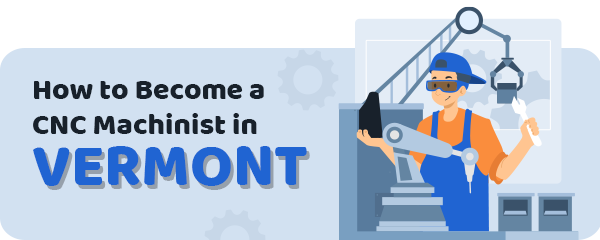If you are looking for a new job, consider becoming a CNC machinist in Vermont.
This profession is somewhat new but has become quite popular recently.
There is no doubt in mind you need training and education before pursuing this career path.
Let’s learn more about the steps you need to take to work as a machinist in this state.
Article Table of Contents
CNC Machinist Job Description
I will first explain CNC – it means Computer Numerical Control.
The machinist works with computer-controlled machines.
These machines are used to cut metal or plastic precisely.
Common machines are lathes, mills, and grinders.
To complete the daily tasks, the machinist has to:
- Set up machines
- Write and test programs
- Make adjustments
- Read blueprints
- Verify parts meet specifications.
CNC Machinist Job Requirements
The job requires:
- High school diploma completion
- Maintaining a 2.5 GPA
- Getting a degree or certification
- Gaining experience
- Possessing essential skills
See the FAQ section below for the specific skills needed.
Becoming a CNC Machinist in Vermont
You should take some steps so that you achieve your dream of becoming a CNC Machinist.
Step 1 – Education
You will need to finish high school first of all.
Of course, getting a GED also works if you can’t get a high-school diploma.
But, you should know things don’t stop there.
You need to go to a post-secondary school.
You should get a certification or degree there.
Later on, we will show you some schools you may be interested in.
Step 2 – Experience
While often overlooked, this step holds significant importance, as experience without certification or degree is challenging to obtain.
Programs providing these credentials often facilitate apprenticeship placements.
Through apprenticeship, you’ll glean invaluable knowledge from seasoned professionals on machine operation.
It’s worth noting that apprenticeships typically come with compensation.
Step 3 – Earn The NIMS Certification
The National Institute of Metalworking Skills provides this credential.
What’s promising is that this credential doesn’t come with an expiration date, as stated on the NIMS FAQ page.
Additionally, the official website highlights that there’s no charge for taking the online test, and you can attempt it multiple times.
Obtaining this credential could lead to increased earning potential.
Step 4 – Apply for a Job
Upon completion of your apprenticeship, you can initiate your job hunt.
You’ll need to independently scout for job openings in your vicinity.
There’s a chance that the institution where you received training and secured your apprenticeship may also assist you in finding a position.
CNC Machinist Training in Vermont
Since a CNC machinist needs a certain set of skills and knowledge, the best way to obtain them is through training.
Let’s see where can you undergo appropriate training for this purpose.
Vermont State University 
In today’s tech-driven world, computers reign supreme, shaping various industries including manufacturing.
Embrace the future of manufacturing by training as a Computer Numerical Control (CNC) Machinist.
Our online course equips you with the essential knowledge and skills to swiftly kickstart your career in this dynamic field.
You will develop important CNC machining skills like math, inspection, safety, metal cutting, materials, quality, and grinding.
The courses cover the following topics:
- Safety protocols for the production floor
- CNC controls and programming essentials
- Metallurgy fundamentals
- Machining and grinding techniques
- Inspection methods
- Principles of Six Sigma, 5S, Lean, and TPM
- Workholding principles
You will learn the following:
- How to prepare for roles like CNC machinist, machine operator, or lathe/mill operator
- Develop confidence in your job performance
- Access exclusive virtual events during National Apprenticeship Week, featuring live webinars, workshops, and employer interactions.
Vermont Technical College 
The course here is called MEC 3041 Advance CNC Machining.
The classes are split as follows – every week there will be:
- 1 hour of classroom education
- 4 hours of lab training
The course has 3 credits and it costs $135.
| School Name | Address |
|---|---|
| Vermont State University | 575 Stone Cutters Way, Montpelier, VT 05602, |
| Vermont Technical College | PO Box 500, 124 Admin Drive Randolph Center, VT 05061 |
CNC Machinist Salary in Vermont
Now, let’s explore the realm of CNC machinist earnings.
Experience and location play pivotal roles in shaping their income.
In this state, the average annual salary for CNC machinists is $48,790.
It’s worth noting that these figures are subject to change annually, influenced by diverse factors.
Scroll down to uncover the cities where CNC machinists can secure higher median salaries.
Annual Salary Range:| Location | Avg. Annual Salary |
|---|---|
| Putney | $52,320 |
| Vernon | $51,830 |
| Hartland | $51,640 |
| Westminster | $51,640 |
| Quechee | $51,640 |
| Reading | $51,640 |
| West Halifax | $51,600 |
| Brattleboro | $51,470 |
| Belmont | $51,390 |
| Jacksonville | $51,380 |
Regional Salary in Vermont
| Region | Employed | Avg. Annual Salary | Avg. Hourly Pay | Top 10% Annual Salary | Bottom 10% Annual Salary |
|---|---|---|---|---|---|
| Burlington-South Burlington, VT | 130 | $54,070 | $26 | $78,120 | $37,350 |
* Employment conditions in your area may vary.
Frequently Asked Questions
Do I earn credits if I continue my education as a CNC machinist in Vermont?
Formal education is the avenue through which you accumulate credits.
Continuing education is tailored for individuals who have already acquired credentials in CNC or related fields.
What are some good skills to have as a CNC machinist in Vermont?
Every CNC machinist is entrusted with refining a core set of indispensable skills:
- Attention to detail
- Mathematical proficiency
- Inspection expertise
- Prioritization of safety measures
- Mastery of metal and plastic cutting techniques
- Understanding of diverse materials
- Adherence to work quality standards
- Proficiency in grinding techniques
Which area of study should I focus on to become a CNC machinist in Vermont?
Mathematics holds a crucial position in the technical realm.
Proficiency in fundamental mathematical operations like addition, subtraction, multiplication, and division is imperative.
Moreover, CNC machinists must be familiar with fractions, percentages, and decimals, as these concepts are frequently applied in their tasks.
Read the full guide: How to Become a Machinist


